Ukraine one year on: Community led recovery in pictures
In January, I met with communities in Ukraine facing ongoing conflict.
It was cold, but sunny with little flurries of snow most days. In the cities, people live normally – but daily air raid sirens, bullet holes and sandbags are the reminder of the ongoing war.
Travelling north to Chernihiv the full brutal impact became clear as we passed whole streets, homes completely flattened, burned, reduced to rubble. Almost 14 million people have been displaced by this war.
Oxfam is working with 10 local partners to support people impacted by war. Many of these organisations were founded by local people at the start of the war with a real grassroots ethos, and they continue to operate in this way – in-depth knowledge of their own communities and responding to the exact needs, whether that’s emergency water response, or realising that people returning to their damaged homes need new windows and doors because of the freezing temperatures.
This is an amazing example of being truly partner, and community, led. I think this is the future of Oxfam.
Letting the light in
“My house was completely destroyed on 12 March. It’s amazing to be back home but I’m so worried it could happen again.” Ana Gendmalo in Ukraine. Image: Kieran Doherty
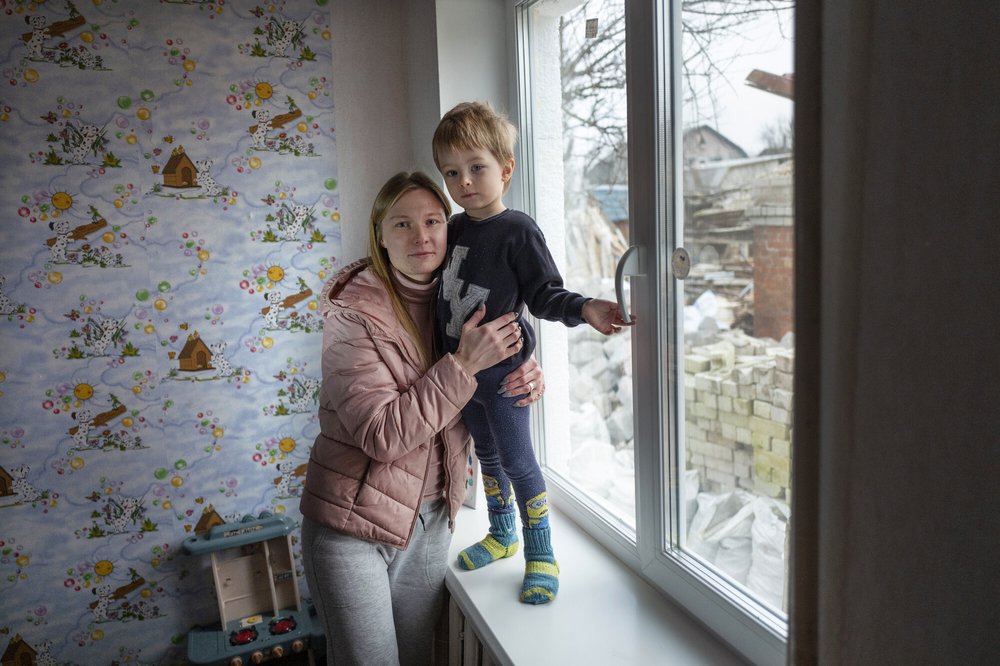
ANA GENDMALO & SERHIY*
Ana told me that one day she just had a strong feeling that she had to leave. She took her son to a shelter. The next morning her house was destroyed. Oxfam partner Anika installed new windows and doors in Ana’s house. We took a few different images in her home but when her son grabbed the handle we felt like we captured a poignant moment.
When we go to people who have no windows, which are boarded up with plywood, and you give them light, both literally and figuratively, you open up this tunnel of light for them, so that they can see something beyond these ruins.”
Anna Kulyeva, founder and director of Charity Organisation “Charity Foundation 'Anika'”
WATER FOR THE COMMUNITY
Oxfam water points in Mykolaiv, Ukraine. Image: Kieran Doherty
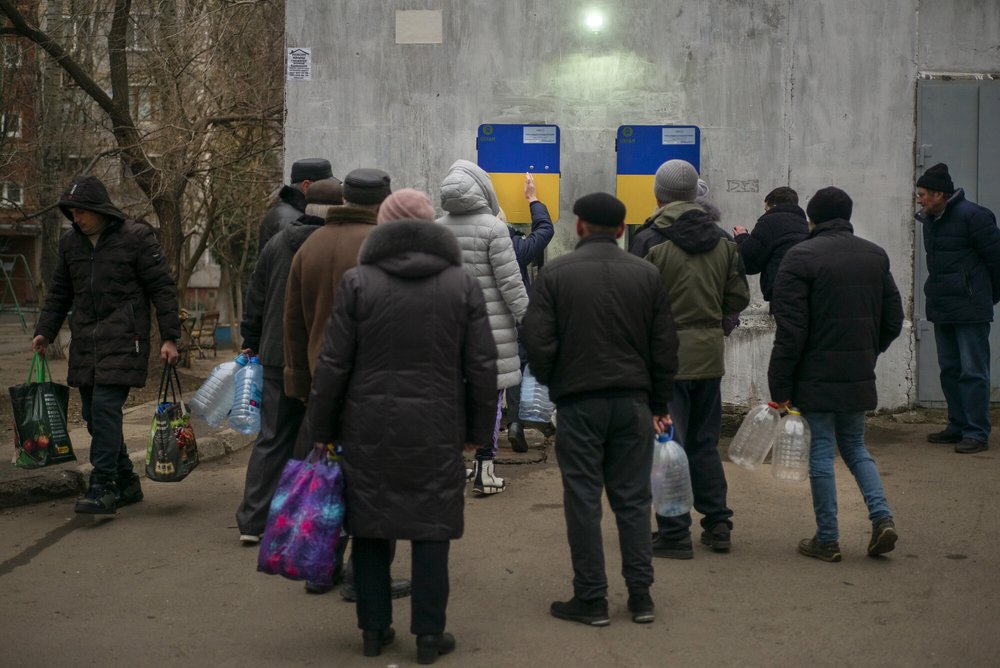
The water systems in Mykolaiv were destroyed early in the war and the shortage of electricity has meant access to clean drinking water is very difficult. Oxfam is working with local water companies to help provide clean water to communities.
I have never seen an Oxfam water point like this one. This photograph captures so well the logo on the water points with the now iconic yellow and blue, and from this image you can really feel the cold.
The water company know exactly what they need. We provide equipment and support them so that they can restore some level of operation. They need generators, pumps, pipes, fittings, consumable like chemicals to treat the water. We start from what the people need and we add up to support them.”
Laurence Hamai, Oxfam Public Health Engineer.
The woman in yellow
"On 16 December, a big tragedy took place: our house was totally destroyed. A shell hit the house and smashed it completely, and we just left in what we were wearing and came here." Tamara Dmytrivnain Ukraine. Image: Kieran Doherty
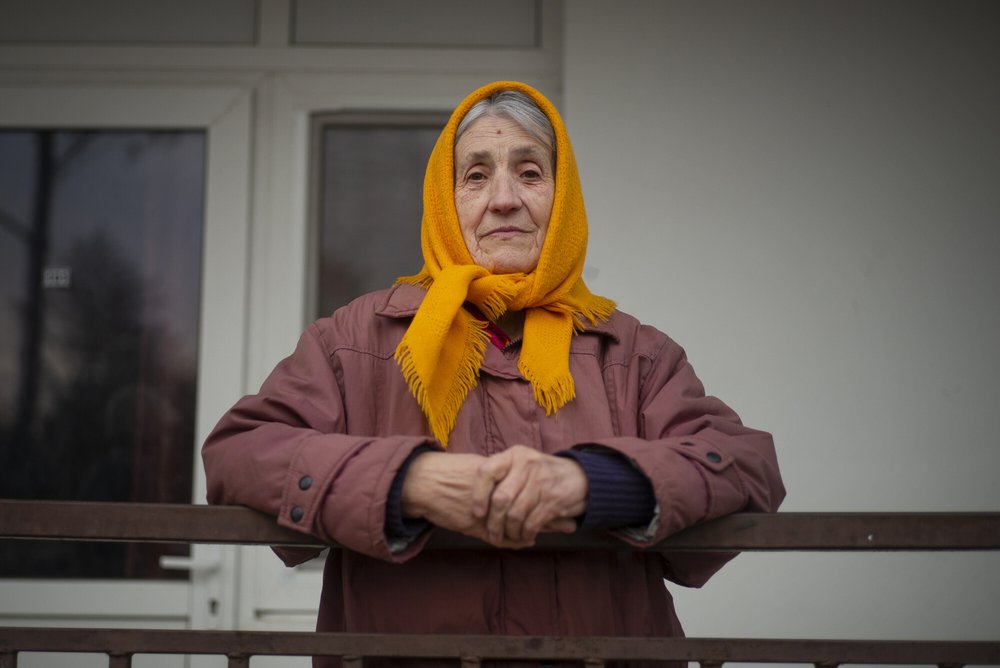
Oxfam partner The Tenth of April (TTA) supports people displaced by the war by providing access to accommodation, safe transport and legal and psychosocial support. We visited one of the shelters, situated in a disused holiday camp.
We were talking with some of the people there supported by TTA and we saw this woman in her vibrant yellow scarf leaning over the railings in the distance. She just stood out – then our TTA colleague said ‘come and meet Tamara’ – the woman in yellow. To me, this portrait demonstrates the resilience I felt from Tamara, and from every person I interviewed.
A big tragedy took place: our house was totally destroyed. A shell hit the house and smashed it completely, and we just left in what we were wearing and came here. We were well received here.”
Tamara Dmytrivna
The school grounds
Burnt and destroyed trees. Image: Kieran Doherty
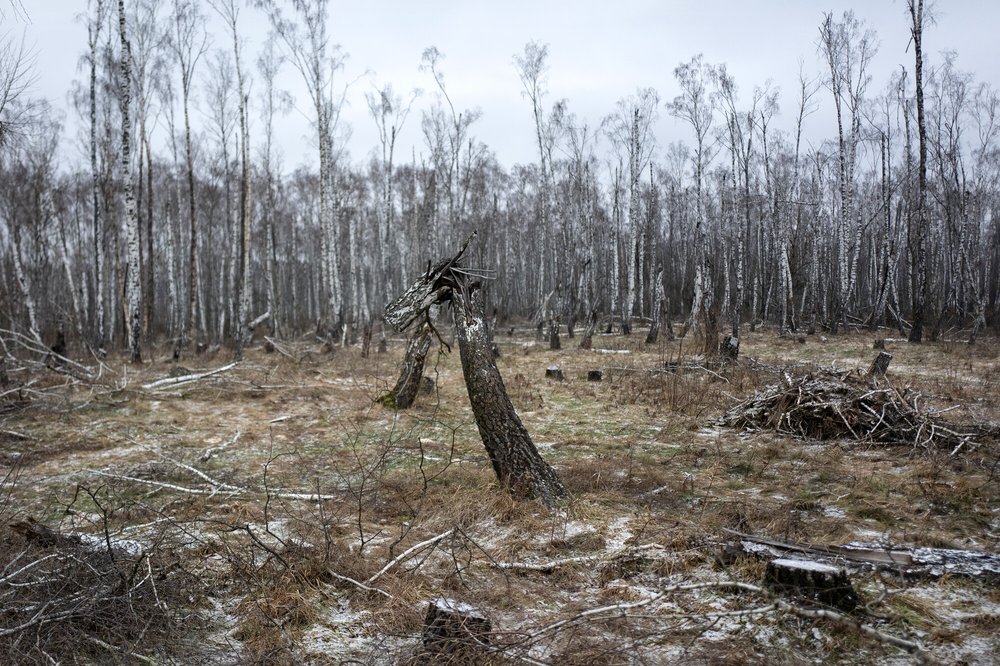
This image was shot in the grounds of a sports school, now home to a temporary shelter where Oxfam and partners are supporting people with basic hygiene items.
The school was destroyed at the beginning of the war. The surrounding forest took the brunt, trees charred and burned. I like the symbolism of that single tree, battered and broken but still standing, echoing that same resilience of all the people I met.
The safe spaces
Aliona Tasenko was sheltering in her cellar with 15 people when a missile landed directly above, in her kitchen. The impact burst a pipe and water flooded the cellar. Image: Kieran Doherty
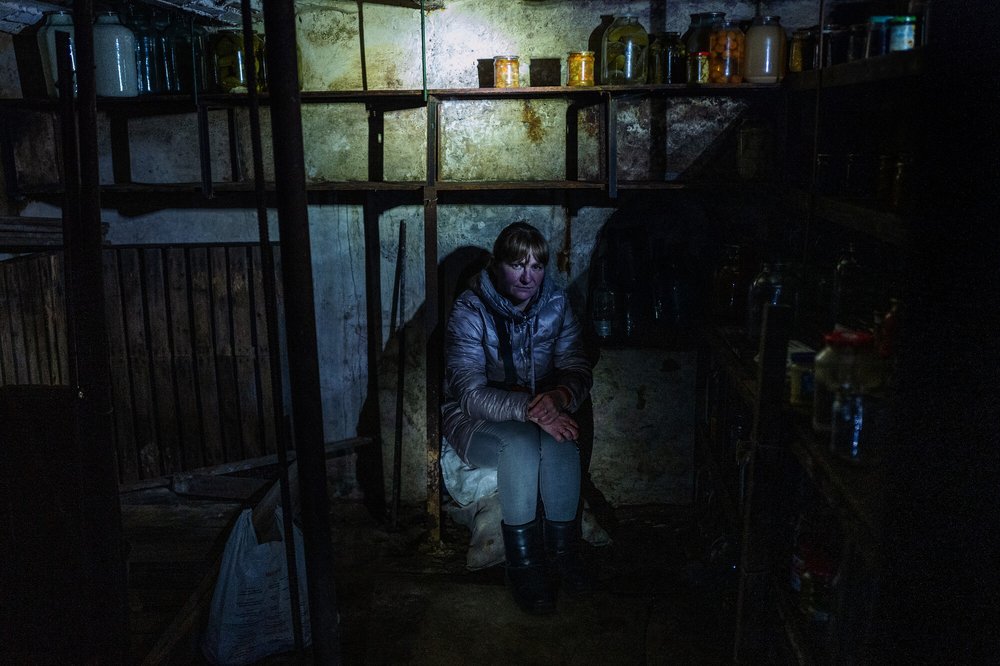
Valentyna Barbas was in her apartment on the fourth floor with her whole family when a missile hit her building. Image: Kieran Doherty.
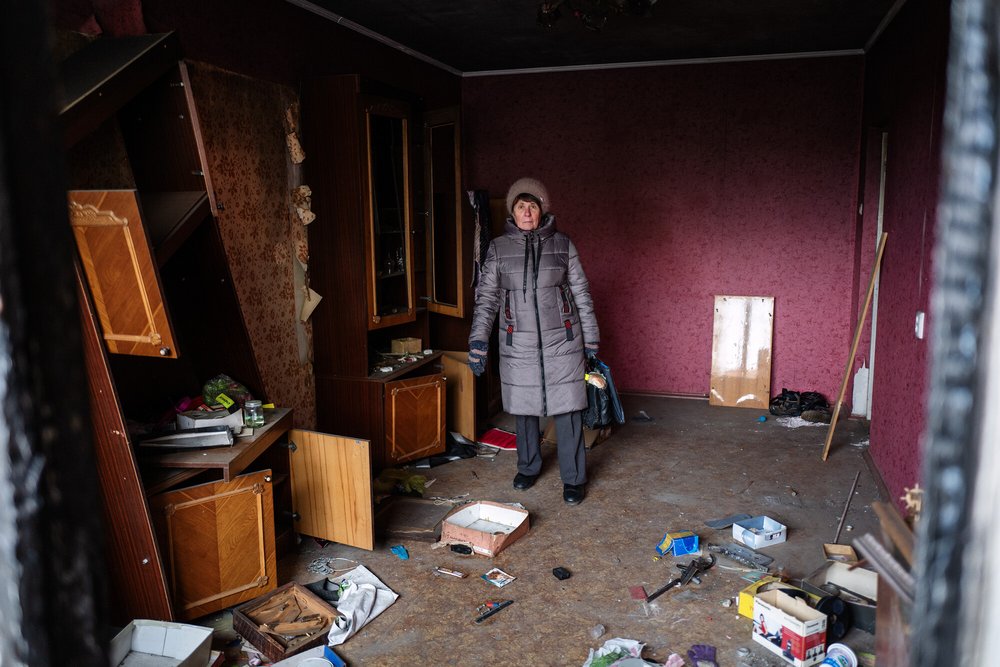
I started to ask people where they went to keep safe during the shellings. Working alongside photographer Kieran Doherty we produced a series of images of people in their ‘safe spaces’ – the majority were hiding in their cellars or basements below their homes, like Aliona Tasenko in the first image. Aliona was sheltering with 15 people when a missile hit directly above, in her kitchen.
The impact burst a pipe and water flooded the cellar. “We first heard whistling and shooting sounds like planes flying. The force of the strike was so hard the children fell off our laps. Water started to run, everything was wet. We were afraid to go up but the water was coming in, first hot then freezing.” The family gathered their documents and stood on the cellar steps. “It was very scary, impossible to come out, the children were crying ‘mother what should we do?”
I was really struck by Valentyna Barbash, who told me she felt safe in her home. Valentyna was in her apartment on the fourth floor having dinner with her whole family when a missile hit her building. “It was calm in the street; so quiet. My grandchildren were in the shelter nearby. I was cooking dinner, I didn’t feel a threat, so I invited the children, took them out of the shelter. I felt safe in my home as there was no air alarm that day.”
Petr Zarovhyi sheltered in the cellar of the Church of St Feodosia with 25 others when the belltower was struck and fell through the cellar ceiling. “There was shelling from all sides, a fire started above while we were down here. The whole church was burned, just the bricks remained, the altar was destroyed, the roof collapsed. I went up to try and save the pictures and books.” After everyone was evacuated safely from the church, Russian soldiers moved in and lived in the cellar, leaving behind rubbish and backpacks with food and tea. “There were tanks driving across cemetery.”
25 people from the local area lived in the cellar below the church. Petr, a church nightwatcher was sheltering when the church belltower was struck and fell through the cellar ceiling. Image: Kieran Doherty
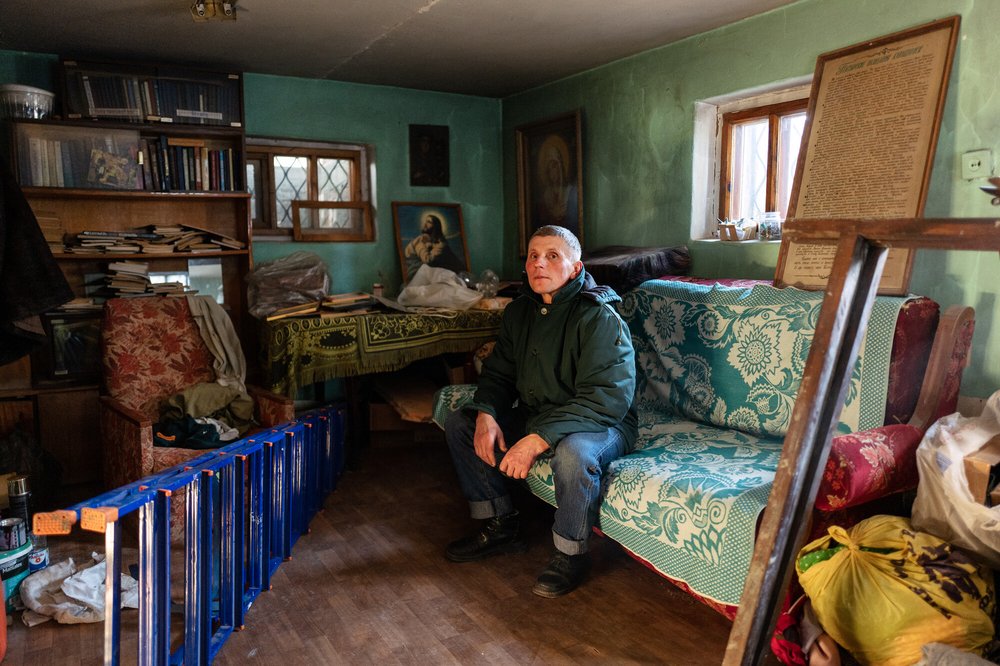
The power of these images is in what you don't see. The safe spaces are below the ground, away from the missiles, the shelling. It forces you to imagine what's above. What they are hiding from.
A destroyed building. Image: Kieran Doherty
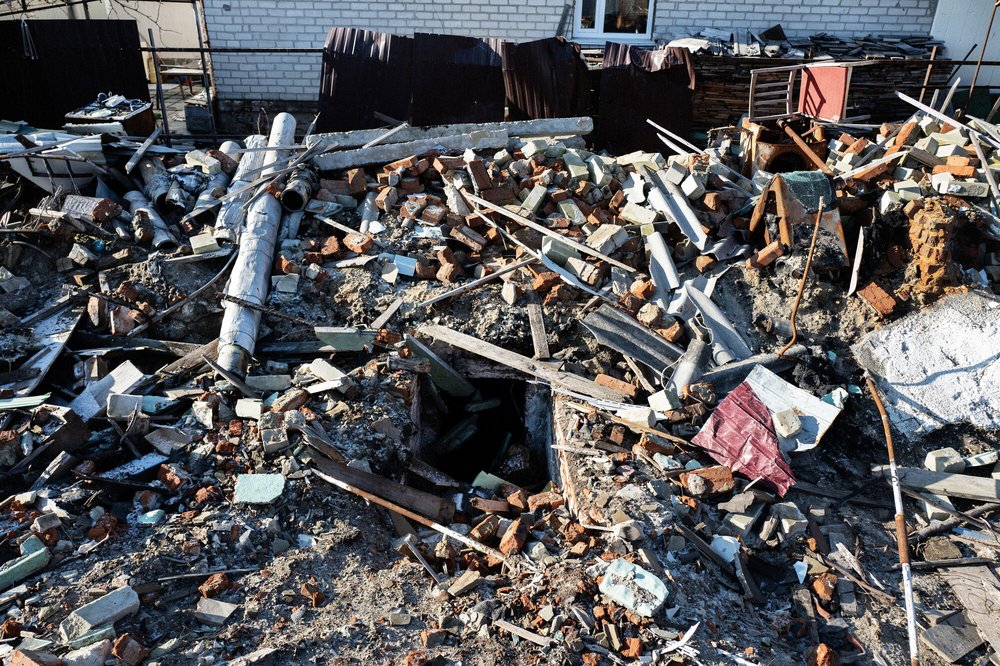
Oxfam and the DEC in Ukraine
- Inequalities show up starkly in disasters – the most marginalised people are worst hit and least supported.
- With our partners, we’re working closely with communities for people in the most vulnerable situations to be seen, heard and supported in our response.
- The UK public has raised an incredible £400 million for the DEC Ukraine Humanitarian Appeal, reaching millions of people affected by the conflict.
Thanks to your donations
Oxfam and its partner organisations have supported 800,000 Ukrainian people who have been pushed into vulnerable situations by this conflict.
Ten Ukrainian partner organisations have provided clean water, electricity, toilets, hygiene kits, food, cash, shelter, transport, psycho-social support and legal assistance to people affected by the war.
Oxfam is working with partners in three border countries that border Ukraine – Moldova, Romania and Poland – to help people survive and rebuild their lives.